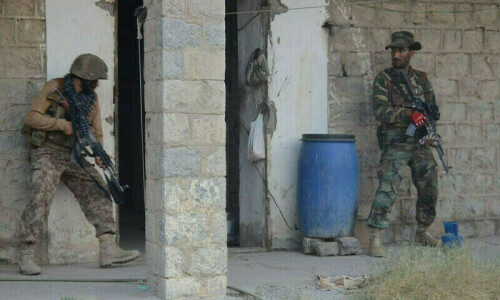ISLAMABAD: Representatives of the federal and provincial governments held an emergency consultation meeting on Wednesday to discuss the impact of the World Health Organisation’s (WHO) travel advisory for Pakistanis going abroad.
It was decided that WHO would be asked to assist Pakistan with the procurement of vaccine and the country would be allowed at least two weeks ‘grace period’ to put its own mechanisms in place before the restrictions on Pakistani travellers are enforced.
According to the health organisation, the poliovirus is being exported from three countries: Pakistan, Cameroon and Syria. The WHO declared it mandatory for people from these countries to receive the vaccine before being allowed to go abroad.
A participant of the meeting told Dawn that one of the first questions posed to WHO Country Director Dr Nima Saeed Abid was when these restrictions would come into force.
“He told the participants that the restrictions came into effect on the day of the announcement, i.e. May 5. He was then requested to talk to WHO headquarters in Geneva for a 15-day relaxation,” he said.
“Dr Nima assured the meeting he would do all that he could to secure the 15-day relaxation. The WHO country head also praised Punjab Chief Minister Shahbaz Sharif for what he referred to as ‘implementing WHO restrictions in Punjab, which is 62 per cent of Pakistan, within 24 hours,” he said.
Following the meeting, a WHO official told Dawn his team would press Geneva to grant the Pakistan government’s request for a 15-day grace period. “This request will hopefully be approved, with certain conditions. For example, one of the conditions may be that the head of state must declare a national public health emergency and establish immunisation counters as soon as possible,” the source said.
But an independent health expert Dawn spoke to said that despite the passage of 72 hours, no concrete steps had been taken to address the travel ban or fulfil WHO requirements.
“In fact, there seems to be a lack of communication between the health ministry and the PM’s cell for polio eradication. WHO has been asked to provide the polio vaccine for nearly 27,000 travellers who are expected to leave the country in the coming days. However, it is the United Nations Children’s Fund (Unicef), and not WHO, that provides the vaccine globally,” he said.
“As per WHO recommendations, the government has to document high quality eradication activities in all infected and high-risk areas. But it is nearly impossible to document cases from North and South Waziristan. In the absence of proper documentation, the restrictions will last a minimum of 12 months,” he said.
“Pakistan broke its own 14-year record when as many as 59 polio cases were reported in just the first four months of this year. The WHO isn’t being as tough on Syria and Cameroon because the former has no cases reported this year while the latter had four,” he said.
The WHO official also took on the state minister for health, who had earlier slammed the body for imposing such restrictions on Pakistan. “It was in fact the International Health Regulations (IHR) Committee that imposed the restrictions. Dr Asad Hafeez was representing Pakistan in the meeting, but he obviously failed to do a good job,” he said.
Also on Wednesday, the Minister of State for National Health Services, Saira Afzal Tarar, told a press conference that the government had asked WHO to assist with the procurement of vaccine. She also said Pakistan had sought two weeks for coping with the restrictions.
The minister said that WHO’s decision overlooked the security situation in Pakistan.














































